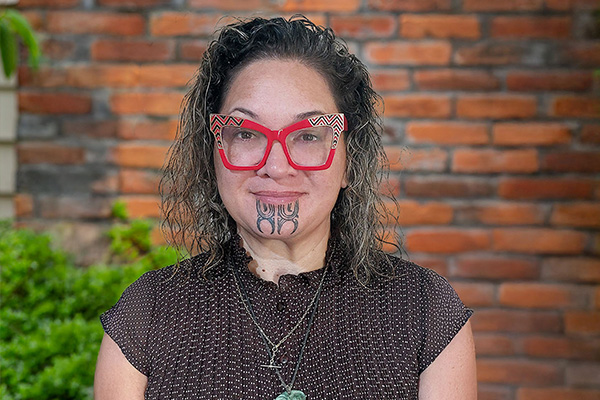Toia to hope ha matatu timu te koko
Ngā tamahine a Te Whakatōhea
Takahia te pipi tahe aku potiki Pākihi kura ki uta kura ki waho
Kapakapa huki te wai para takoto te one
Koopu e oho
Koopu e oho
Kai kirikiri tuatua
Waiaua te kai a te karoro koa
Totoia atu totoia mai
Mai ngā kurī a Whārei ki Tihirau
E i te Tapu on Muriwai e
Ko Hinewai Quensell ahau ko au te Mata Ārahi matua o Ringa Hora. I am the Senior Vocational Pathways Advisor.
I am a self-proclaimed pracademic. During college I had 3 jobs. I was a part-time cleaner Monday-Friday. Thursday-Friday nights, I worked at a local Chinese restaurant, and during kiwifruit season, I was in the packhouses. I have been a Travel Agent, a credit union loans officer, a contact centre operator, and a team manager; I have a rental property and have been a board member of an Indigenous Framework Qualification.
In the lead-up to Ringa Hora, I was a Business/Bi-cultural Social Services Kaiako for TWOA for 7 years before taking on the role of Regional Engagement Lead for Toi Ohomai, assisting students both academically and in pastoral care.
So, when I looked at all Ringa Hora industries, the only industries I had yet to dabble in were Aviation, Government, & Real Estate. I thought I may have something to offer in terms of a Māori lens and the experience of an end user of our credentials.
All in all my experience got me in the door in my many roles, but I was always required to gain more “tohu” in order to get more money. So therefore, I have more diplomas than anyone cares to notice. (Go on have a look at my Linkedin profile lol).
What attracted you to your current role in Ringa Hora? What are your responsibilities?
As a Regional Engagement Lead you see what works best for our underserved learners and what does not work. My husband who is of Tongan descent, with English as his second language, is in his final stages of his apprentice in a trade. His experience taught me that we have got to do better by Māori and Pacific learners who absorb information differently. I knew if there was going to be “transformative” change then I wanted to be an active cog in that transformation.
Identifying barriers for our underserved learners has become a continual topic of conversation and Ringa Hora has provided the space to be of service.
As a Senior Vocational Pathways Advisor, you become aware of the multiple entry and exit points into our industries and the layers of complexity in the transition from secondary schools. How can we ensure all our rangatahi leave with something? A part of my role has been to work collaboratively with the Tertiary Education Commission (TEC) on the National Careers Strategy 1.4 setting the criteria for advice, information and guidance, and helping to coordinate the occupations displayed on the Tahatū careers website pilot and championing Inspiring Futures.
Reviewing current pathways and making these more visible is a long-term goal with lots to cover, and will be ongoing, as the change in pace of technology and AI advancement is creating opportunity and new purpose within some of our pathways.
I am privileged to do a lot of cool stuff. The opportunity to co-design the Ohu Ahumahi Mata Ārahi Manomano | Careers Pathways Framework; the South Waikato workshops for Te Manu Arataki – Leadership project with 50 potential leaders from five schools helping Ringa Hora shape our leadership credentials; and the numerous workshops delivered at CATE, TESAC, TENZ conferences/summits that align with Ringa Hora Kaupapa.
What role can Ringa Hora play in making the industry better? What achievements of Ringa Hora are you most proud of?
Tane Aukaha is a manifestation of Tane where he had the ability to listen to both the said and unsaid. Therefore, our greatest gift is to hear what industry want to see in the Vocational Education system and be proactive in our quest to make transformative changes on their behalf. Making a complicated system more simplified.
What I am most proud of with Ringa Hora is the unlimited supply of leaders amongst our kaimahi and the ability to work collaboratively across Ngā Ohu Ahumahi. Getting the culture right through Māori values and setting a great foundation for our kaimahi to thrive is no easy task. I am proud of the cultural capability that we have at Ringa Hora that is anchored by great uaara Pono, Tika, Aroha, Marama and Manaakitanga. To quote “Culture beats strategy for breakfast” (Drucker)

